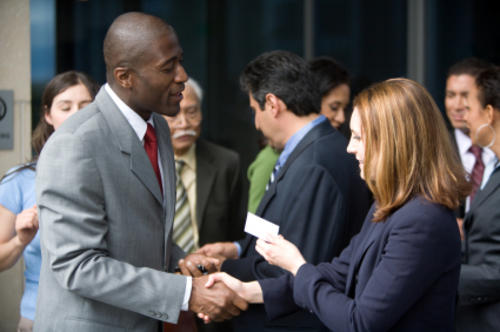How to Network
Everyone’s heard the saying “It’s not what you know, but who” and it really is true. Your best resource in this interconnected world is your social network.
How does one develop a good network? If you’re shy and introvert, it can be difficult, but there are ways to overcome this.
Opening Up
The most important point to remember is that even shy and introverted people can get animated and open up when they are really interested in a topic. Find out local groups for your own hobbies – you’ll find it so much easier to approach people with a common interest.
Remember, the golden rule is to listen more and talk less! Let your new acquaintances show their personalities, show empathy and offer compliments and you’ll soon find yourself forgetting your own shyness.
Online Networking
The Internet offers amazing opportunities to extend your social network. Sign up on a forum or special interest group that you can actively contribute to. To start with, express your views in a friendly but objective way. Keep out of arguments. Get a “feel” of the others in the group. In time, you could strike gold and develop some really meaningful contacts.
Look Outside Your Profession
Cast your net wide by attending functions outside your profession. There is always the possibility that a person you meet at a non-profession related function knows someone in their own social network who is in your line of business.
Business Cards
Business cards are a handy networking tool.. Get some printed up for yourself and give them out judiciously. Do ask people you meet for theirs, but don’t go around collecting cards from everyone present. Use the cards you collect to record details of the person on the back such as birthdays, interests and hobbies. When accepting a card, compliment the giver on its design or wording, so that the person feels important and valued.
When it comes to your own business card, don’t try to go for something outrageous or abnormally sized. What seems smart and amazing to you can have completely the opposite effect on someone else.
Follow Up
Remember to follow up after you’ve broken the ice. If you have promised to email someone after your first meeting, make sure that you do just that. While sending the email, express your gratitude for the opportunity to meet. Convey the hope that you can work together in the future – this quite often leads to you being brought to mind when your particular service or experience is needed.
After you’ve met someone new, don’t wait for them to contact you; instead give them a call, suggest a cup of coffee. If you hear of bad news in their area – a fire or accident for example – call them and show your concern.
Don’t be afraid to ask for help from your social network – it’s not a crime to need assistance and most people are only too pleased to be able to help out,
What are the things to avoid when meeting a whole bunch of new people?
Body Language
Be aware of your body language. Up to 93% of communication between people is non-verbal, so make sure that you show genuine interest in your new contact not just with your words but with your reactions, too.
Your posture says a great deal about you. Standing with your shoulders back and your chest out will give you an air of confidence; on the other hand, slouching, or drooping shoulders conveys a lack of self-confidence and turns people away.
A handshake reveals a lot. Make your handshake firm but don’t use the politician’s two-handed handshake – this conveys the message that you are invading the other person’s space and is unlikely to be well received.
Make sure you establish eye contact – this shows you are interested in the other person – but don’t gaze into the other person’s eyes all the time. Around 80% - 90% is a good rule. Remember to look into the other person’s eyes as you say goodbye, to create a lasting impression.
Smiles can create a positive impression, but don’t walk into a room smiling or even worse, giggling. You will create a better impression if you first establish your presence in a room before releasing that smile.
Remember, what you practice in your own body language can give you clues about those people whom you meet.